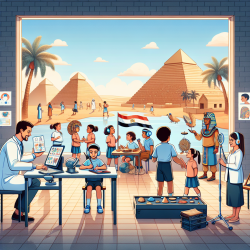As a practitioner focused on creating optimal outcomes for children, understanding the prevalence and determinants of developmental delays (DDs) is crucial. The recent study titled "National screening for developmental delays and their determinants among Egyptian school age children: A step towards implementing life skills programs" offers valuable insights that can enhance your practice.
This extensive study screened 20,324 Egyptian children aged 6 to 12 years, revealing that 7.4% had at least one developmental delay. The most common delay was in communication (6.4%), followed by daily living skills (2.0%). The study utilized the Vineland Adaptive Behavior Scales to assess gross motor, fine motor, daily living skills, communication, and socialization skills.
The multivariate logistic regression analysis identified several key determinants associated with developmental delays:
- Children suffering from any convulsions (AOR = 4.32; 95% CI: 3.18–5.88)
- Male gender (AOR = 1.86; 95% CI: 1.65–2.09)
- Birth weight less than 2.5 kg (AOR = 1.77; 95% CI: 1.40–2.24)
- History of maternal health problems during pregnancy (AOR = 1.64; 95% CI:1.34–2.01)
- Children staying in an incubator for more than two days (AOR = 1.57, 95% CI: 1.29–1.91)
- Less educated fathers (AOR = 1.55, 95% CI: 1.24–1.95)
- Belonging to the middle social class (AOR = 1.40, 95% CI: 1.24–1.58)
These findings suggest that targeted interventions and life skills programs could be tailored to address the specific needs of children with these risk factors. As practitioners, you can leverage this data to prioritize early screening and intervention, especially for children presenting with the identified risk factors.
Additionally, the study highlights the protective effect of maternal education and living in certain geographical areas (Lower and Upper Egypt) against developmental delays. This suggests that enhancing parental education and leveraging community support structures could be beneficial strategies.
Implementing life skills programs that focus on communication, daily living skills, and socialization can significantly impact children's long-term development. These programs should be designed to include parents, teachers, and peers to create a supportive environment for the child.
Encouraging further research in different geographical and socio-economic contexts can help in understanding the broader applicability of these findings and in developing more comprehensive intervention strategies.
To read the original research paper, please follow this link: National screening for developmental delays and their determinants among Egyptian school age children: A step towards implementing life skills programs.










